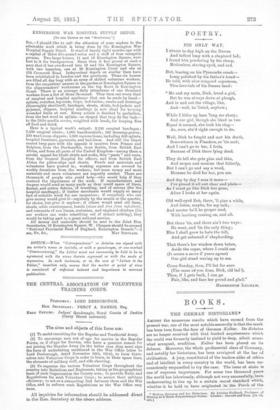KENSINGTON WAR HOSPITAL SUPPLY DEPOT.
[To TEE EDITOR OP THE "SPECTATOS."1 St,—I should like to call the attention of your readers to the admirable work which is being done by the Kensington War Hospital Supply Depot. It started barely eight months ago with a capital of three five-pound notes and a staff of four energetic persons. Two large houses, 11 and 12 Kensington Square, were lent to it for headquarters. Since then it has grown at such a, paw that it has overflowed into 13 and 18A Kensington Square, with two branches one at 20 Kensington Court and one at 170 Cromwell Road. Independent depots on eimilar lines have been established in London and the provinces. These six houses are filled all day long with an army of skilled volunteer workers, from the carpenters' annexe in the garden at Kensington Square to the slippormakera' workrooms on the top floors in Kenqington Court. There is an average daily attendance of one thousand workers from a list of three thousand. They turn out every kind of surgical and hospital appliance that can be made by hand— splints, crutches, leg-rests, trays, bed-tables ; swabs and dressings (thoroughly sterilized), bandages, sheets, shirts, bed-jackets and pyjamas, slippers, hospital sandbags (a new idea) for keeping wounded limbs at rest. Every article is finished to perfection, from the last word in splints—so shaped that they fit the limb— to the little muslin covers, weighted with beads, for keeping flies off food and drink.
Here is a typical week's output: 9,250 surgical bandages ; 7,500 surgical swabs ; 1,000 handkerchiefs ; 100 dressing-gowns ; 350 ward-room slippers ; 1,000 various items, including 800 splints, hospital furniture, garments, and bed-linen. And still the Depot cannot keep pace with the appeals it receives from France and Belgium, from the Dardanelles, from Serbia, from British East Africa, and from all parts of the United Kingdom—among them a special appeal for khaki shirts and socks, thin "pants" and vests, from the General Hospital for officers, and from British East Africa for pillovr-slips and sheets. Funds and materials and volunteers have poured in ; working expenses are covered by weekly donations from the workers; but more money and more materials and more volunteers are urgently needed. There are thousands of people who could help—who would help if they realized the importance of the work. If manufacturers and drapers would send as many yards as they could spare of linen, flannel, and cotton fabrics, of towelling, and of canvas (for the hospital sandbags) ; if timber merchants would supply so many feet of suitable wood for our carpenters ; if everybody who can give money would give it—regularly by the month or the quarter, for choice, but give it anyhow; if others would send old linen, sheets, white counterpanes, towels (clean and free from infection), and remnants of new linens, cretonnes, and unglazed chintzes (for our workers can make something out of almost nothing), they would be taking part in a great national service.
All money and materials should be sent to the Joint Eon, Secretaries, 13 Kensington Square, W. Cheques should be crossed "National Provincial Bank of England, Kensington Branch."—I


































 Previous page
Previous page